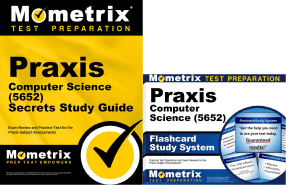If you need help studying for the Praxis Computer Science test or just want some more information about what the test is like, you’ve come to the right place!
Click below to take a free Praxis Computer Science practice test!
What’s on the Exam?
First, let’s talk about the questions on the Praxis Computer Science test. There are 100 selected-response questions in total.
Selected-response questions can appear in several different forms:
- Single-selection multiple-choice
- Selecting ALL correct answers from a list of choices
- Selecting the correct answer from a drop-down menu
- Clicking parts of a graphic such as a map or a chart
- Dragging and dropping answers into a targeted area on the screen
The time limit for the test is 3 hours. There aren’t any scheduled breaks, but you’re free to take restroom breaks as needed!
Let’s take a closer look at the different sections of the Computer Science test:
1. IMPACTS OF COMPUTING
15 questions
- Understanding computing as a way of creative expression and problem-solving
- Obstacles to equal access to computing among different groups
- Benefits and harms of computing innovations
- Methods of protecting intellectual property rights
- Ethical and unethical computing practices and their implications
- Privacy and security issues
2. ALGORITHMS AND COMPUTATIONAL THINKING
25 questions
- Understanding abstraction as a foundation of computer science
- Develop algorithms using pattern recognition, abstraction, and problem decomposition
- Number base conversion
- Binary, decimal, and hexadecimal number systems
- Develop and analyze algorithms in various formats
- Time, space, and solvability limitations of computing
- Searching and sorting algorithms
- Analyzing sorting algorithms for correctness
- Simple recursive algorithms
- Using randomization in computing
3. PROGRAMMING
30 questions
- Writing and modifying computer programs using a text-based language
- Analyzing computer programs for correctness
- Extensibility
- Modifiability
- Reusability
- Sequence, selection, and iteration
- Using standard operators and operator precedence to write programs
- Using variables and various data types
- Writing and calling procedures with parameters and return values
- Event-drive programs that respond to external events
- User experience
- Familiarization with dictionaries/maps, queues, and stacks
- Debugging techniques
- Obtaining and using feedback to produce high-quality code
- Using libraries and APIs
- Validation of correct inputs
- IDEs
- Differences between high-level and low-level programming languages
- Different programming paradigms
- Object-oriented programming concepts
- Program compilation and interpretation
4. DATA
15 questions
- Understanding bits as the universal medium for expressing digital information
- Data encryption and decryption
- Analyzing data using computational tools
- Simulation and modeling
- Storing, managing, and manipulating data
- Data collection, aggregation, and generation
5. COMPUTING SYSTEMS AND NETWORKS
15 questions
- Familiarization with computing systems in everyday objects
- Uses, features, and capabilities of different computing systems
- Familiarization with computers as layers of abstraction from hardware
- Executing a computer program
- Trade-offs among cloud, network, and local computing and storage
- Communication between devices
- Network components
- Factors that impact network functionality
- Internet and web protocols
- Digital and physical strategies for maintaining security
- Cybersecurity concepts
- Web components
How to Register
To register for the test, you’ll need to create an account on the ETS website. Once your account has been created, you can submit your application to take the test.
When you submit your registration, you will need to pay the $130 testing fee.
Praxis Scores
The Praxis Computer Science test is scored using a scaled scoring method. Here’s how it works:
For every question you answer correctly, you get one point added to your raw score. At the end of the test, your final raw score will be converted to a scaled score. This scaled score will range somewhere between 100 and 200. The passing score varies from state to state, but most states require a final score of 149 to pass.
The reason your raw score is converted to a scaled score is because everyone that takes the test is given a slightly different set of questions. Since everyone has a different arrangement of questions, and because some questions are harder than others, converting your raw score to a scaled score ensures a more even playing field.
FAQs
How many questions are on the Praxis Computer Science test?
The test contains 100 questions.
What is the time limit for the Praxis Computer Science test?
The test is timed at 3 hours.
What is the passing score for the Praxis Computer Science test?
The passing score varies depending on what state you take the exam in, but most states set the passing score at 149.
How much does the Praxis Computer Science test cost?
The testing fee is $130.



 Praxis Study Guide
Praxis Study Guide Praxis Flashcards
Praxis Flashcards